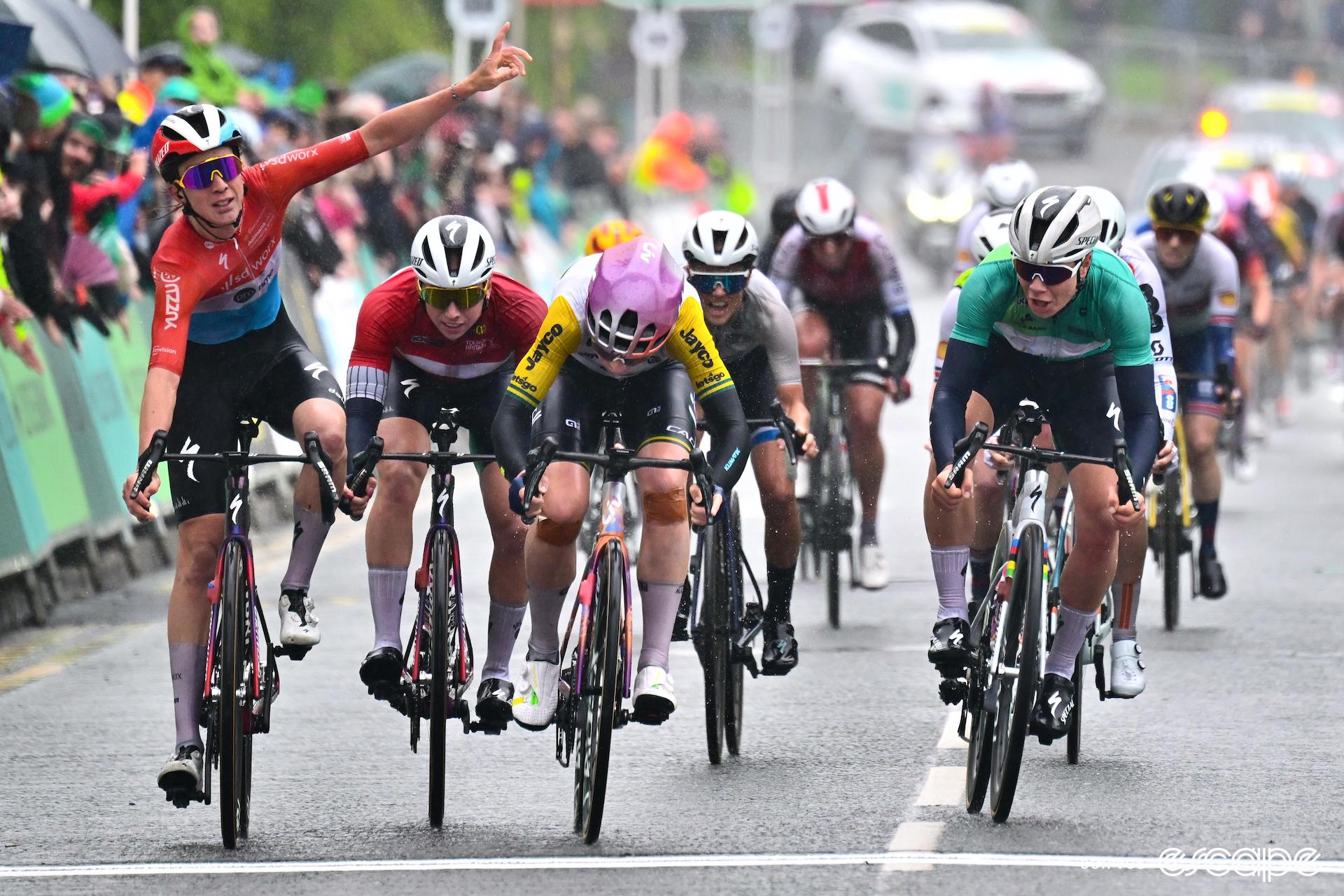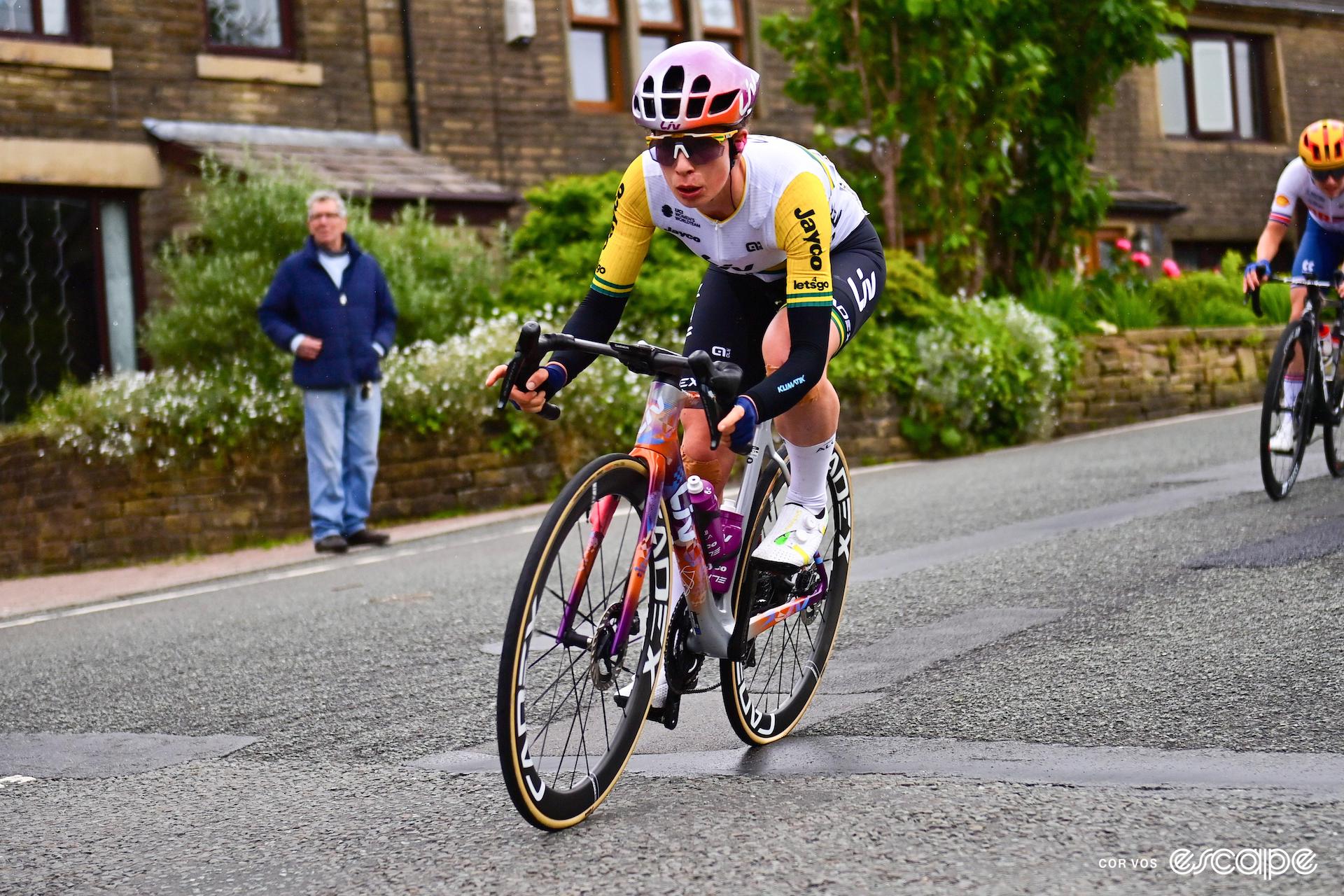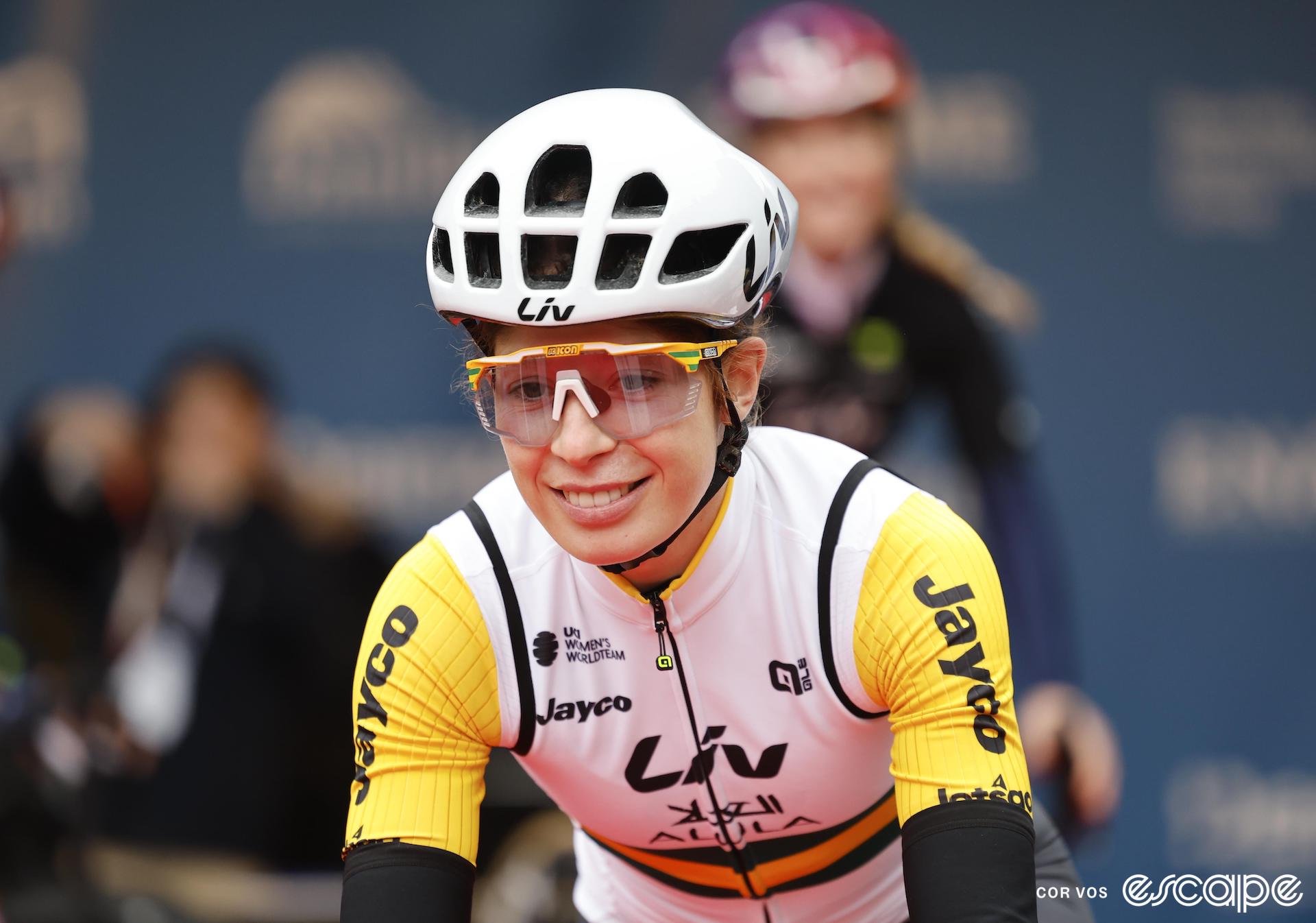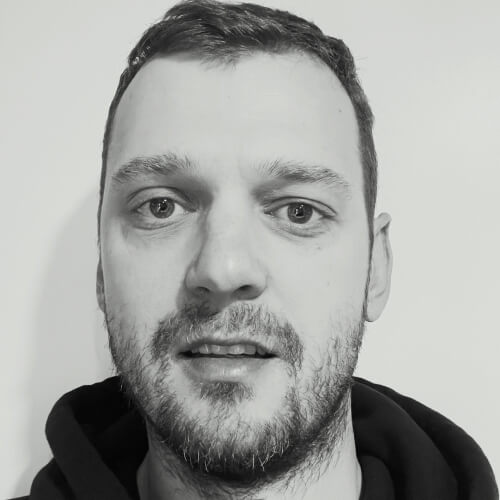This past Sunday was a big day for Aussie road champion Ruby Roseman-Gannon (Liv AlUla Jayco). On the final stage of the Women’s Tour of Britain, on a day where she was supposed to be riding in support of her sprinter Letizia Paternoster, Roseman-Gannon found herself with an opportunity.
When Paternoster punctured just 4 km from the finish, Roseman-Gannon was the team’s best chance of a good result in a reduced bunch sprint. When it came to that sprint, SD Worx-Protime looked to have the stage won with overall leader Lotte Kopecky … until Kopecky tried to hand over the victory to tireless (and soon-to-retire) domestique Christine Majerus.
Majerus sprinted for the line and celebrated when she got there, but she’d been pipped on the line by Roseman-Gannon who snuck in to take her first professional victory in Europe, in a WorldTour race no less.
A few days later, Roseman-Gannon took some time during a mid-ride coffee stop in Andorra to chat to Escape about her breakout victory. The following Q&A has been lightly edited for fluency and clarity.

***
Matt de Neef: What’s the last few days been like for you?
Ruby Roseman-Gannon: Pretty busy to be honest. Just with the travel, and then coming back up here. And I haven’t slept the best. I’m not sure whether it’s just stress from the travel or maybe also from excitement. I don’t know – it was a big four days. But now I’m back into a bit of routine, which is nice.
MdN: I’m guessing you got a whole bunch of messages from people back home after the win?
RRG: Yeah, it was actually surprising how much mainstream media wanted to cover it. I think there was a report a bit earlier this month of a runner doing the same thing [celebrating early like Majerus – ed.] And then I think that gained a bit of traction. So then a lot of the mainstream news media got on it, which is probably good for the sport to be honest. But yeah, surprising.
MdN: Coming into the final stage of the Tour of Britain, were you guys pretty happy as a team with how it had all gone? Letizia had been second on stage 1, then fourth on stage 2, Georgia was third on stage 3, Letizia was sitting third overall …
RRG: Yeah we were happy, but we wanted a little bit more. We wanted to try and sort of challenge for second or first place [on GC]. We knew it was difficult, but we were like ‘We might as well be aggressive and not settle for a podium on GC but really set something up.’ So we paced the first climb really hard with Teniel [Campbell] and split the bunch, and it came back together. And then again on the steep 10%, 1 km kilometre berg, and it split there, came back together. It just sort of kept coming back together because it wasn’t the right combination or there was someone from behind that wanted to get back up.
Then we were all in for the stage for Lettie [Paternoster] because she was sprinting so well we knew that she was our best shot to give it a go. And then my role was more to follow late attacks. I did end up in one in the last 10 km. But again, it was like … SD Worx didn’t want to work in that with [Elena] Cecchini and then Flora Perkins was just sitting on and it just sort of fizzled out. But I wasn’t really thinking about the finish at all. Not until Lettie had the puncture at 4 km to go.
I think there’s video footage of me attacking while she’s getting a puncture, because I’d been told in the radio to go. And then at the same time, she just got a puncture, but she couldn’t speak into the radio because she had no control of the bike through the roundabout. Then we heard she had a puncture and I was like ‘Shit.’
I think DSM started pacing at this point, which was, I mean, it was coming to the final, so it’s anything goes I think, but I was like, ‘Oh, this is gonna be really difficult for her to get back now.’ So I called in the radio to ask whether I needed to go back. They just said ‘No, just focus on the finish’ because getting through the convoy isn’t necessarily easier with more people at that point in the race. But unfortunately, she never made it quite back.
And then I just put myself on Lorena Wiebes’ wheel which honestly wasn’t as hard as I thought it would be. Often people are really fighting but I think everyone was so tired and it wasn’t your sort of pure sprinters in that bunch. And then we came around the corner hoping to sprint for a podium. But then it was so crazy.
Normally in a sprint like that, everyone’s sort of just riding away from you and you’re just doing everything you can to stay with them or stay in the slipstream. But this time no one went, really. We sort of just propped and then I was sprinting and then just as I got to the line … I was going for the best result I could, but I wasn’t thinking about the win at that point.

MdN: Just going back to that moment where you had to switch from riding for Lettie to riding for yourself at the finish. Can you talk about what that mindset shift is like?
RRG: It can be quite challenging, actually. Because you sort of race in a different way when you’re more support versus leader. But in that moment, it was so close to the finish that I just went into full flow mode and focused on positioning. There wasn’t really time to think – it was like 3 km to go. So it was just, yeah, kind of running off instincts.
MdN: When you go back and watch the final sprint, and the way that SD Worx-Protime played it, what’s your perspective on that?
RRG: Look, I think it was really cool what they tried to do. They did succeed in getting Majerus on the podium, the GC podium, so that was definitely a success. And I really like watching teams take a rider who’s always working and put them up for the win.
If it was Kopecky or Wiebes that had come second, then … I guess they just win so much that there’s not as much feeling around that. But I think with Majerus she’s almost always working and it would have been so nice – she’s retiring this year – for her to win.
Part of me was like, it was pretty cool to see them do that. But then at the same time it was an opportunity that I took in that moment and I don’t regret it at all. It was the right decision. And I was just racing my race. So I wasn’t thinking about anyone else.
But yeah, rewatching it now, it is a funny finish. I still kind of laugh in shock at how it all played out. I guess a lot of different circumstances led to that point. Lettie getting the puncture … because if Lettie hadn’t had the puncture, and she was in the bunch, I don’t think they would have ridden like that. They know that Lettie is so fast. So it was kind of just a series of events that led to that moment.
MdN: Did you have anyone on social media trying to tell you ‘Oh, you only won this because they stuffed it up?’
RRG: Not really. I think everyone loves to see an underdog win. So I think a lot of the vitriol was directed at them [SD Worx] rather than me, which I don’t think is necessarily fair on them. They did the best they could and they made a mistake. Everyone does. I think Australians in particular love an Aussie battler coming through at the last moment. So I think it was mostly positive.
MdN: Can you tell me about those moments right after the finish when you realised you had won it and then Amber Pate comes up to you and she’s yelling in your ear. That all looked amazing from the outside – what was it like being in that moment?
RRG: It was pretty crazy. Anytime I finish a race you’re so filled with adrenaline that you can’t really think straight. And often I’m sort of just saying things and not really thinking. It’s a really weird state to be in. But particularly that moment, it was just beyond what I ever comprehended would happen in that race. It was just such utter shock.
I was pretty sure I hit the line first, but then I couldn’t quite believe it. And we’d just had the first stage where Lettie had thought she’d won and we’d been standing on the side of the road almost celebrating and then Lotte [Kopecky] had won so then I was like kind of trying to hold a little bit back because I was like ‘I don’t want to get too excited in case they look at the photo finish and I didn’t win.’
But yeah, it was pretty cool. And yeah, to have Amber and Lettie and the whole team … that win was lucky in some ways, but in other ways, the team had ridden so well all week and had sort of created that situation in that race. Like on that first climb Teniel did … the whole team did – Georgia [Baker], Jeanne [Korevaar] – but Teniel did a massive effort and it really brought the bunch down to 30 riders. So it was kind of a tribute to all of them, and how hard they’d worked because I think we’re really getting on a roll as a team. The strength and depth that we have this year compared to last year is pretty amazing.
MdN: Can you talk a bit about the significance of this win for you, personally? It’s your first win in Europe, your first WorldTour win, and it comes after what looked to be a pretty frustrating spring for you …
RRG: This year hasn’t gone the way that I wanted it to go, for sure. I’ve felt a bit out of control with the situations that I’ve had. I haven’t been able to train 100%, I’ve had to manage injuries and miss races and stuff. So it hasn’t panned out how I planned but at the same time, I guess it’s a good example of even if things don’t go how you imagined they would, you can still make the most of what you have when you have it.
I was not super confident coming into the Women’s Tour [of Britain], because I’d been sick the week before and knew that I’m not at my best, physically. So I really had some doubts in my mind. Originally I was supposed to be shared GC [leader] with Lettie but I didn’t have the legs really to do that. So I think it’s always hard when you have higher expectations of yourself, but you also know that you are where you’re at.
So yeah, it was nice [to win the final stage], because sometimes random things happen in a good way as well.
MdN: You had more than two months off racing there after Nokere Koerse in March. I know you said on social media that you had a crash there that meant you couldn’t race. Are you able to talk a bit more about what happened and the injuries involved?
RRG: I had a really deep wound that took two weeks to heal, and it was on the knee joint, so I couldn’t really bend my knee. And I needed stitches but the position it was in would have required plastic surgery. And the team decided not to get it stitched up just because there’s also infection risks with a wound that deep, if you close it over.
So that was part of it. And then the other part was that I also had bone bruising between the patella and the femur, which is called ‘moviegoer’s knee’ because you can’t really keep your knee bent for a long period of time. You just sort of get this buildup of pressure and pain in your knee.
But I was lucky enough not to have it affect me riding too much. But things like gym or sprinting, I was getting a fair bit of pain. And the more pain you get, the more chance you have of prolonging the bone bruising. So I was just sort of managing that with physios and the medical team. I was really well looked after. It was a frustrating period, but I got through it.
MdN: What’s next for you?
RRG: I’ll do a training block in Andorra until the Giro, do the Giro and then another training block and then the Tour de France.
MdN: We talk a lot in journalism about wins creating confidence and how riders feed off that confidence. Do you feel like you’re the sort of rider that will take that win and go ‘Well, I’ve done it before, I can do it again’, and that’ll help you go on to the next thing?
RRG: I think everyone normally gets a lot of confidence from a win. For me, the one thing that I will definitely take from it is, you don’t necessarily have to be physically your best or in your best mindset. Sometimes you just have to rock up at a race and give it your best and see what happens.
I think there’s a tendency amongst a lot of athletes, including myself, to want to control, and come in with confidence and have everything in control. But sometimes if you just let go and just go with it, sometimes things randomly just work out.
On the confidence from wins thing: there’s a lot of studies they’ve done in mice and animals, and they sort of manipulate the situation so that some mice win, and some mice lose and the mice that win keep winning, even though they’ve manipulated the situation. And the mice that lose keep losing. [Roseman-Gannon finished a science degree, majoring in neuroscience, right before turning pro – ed.]
I think it is true, even in that sort of situation, just like on a very basic essential level: if you win, you know you can and you sort of get addicted to it, and you keep going for it.
Did we do a good job with this story?

